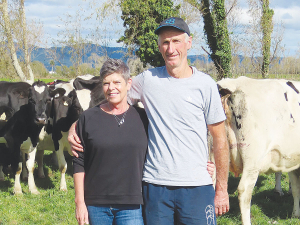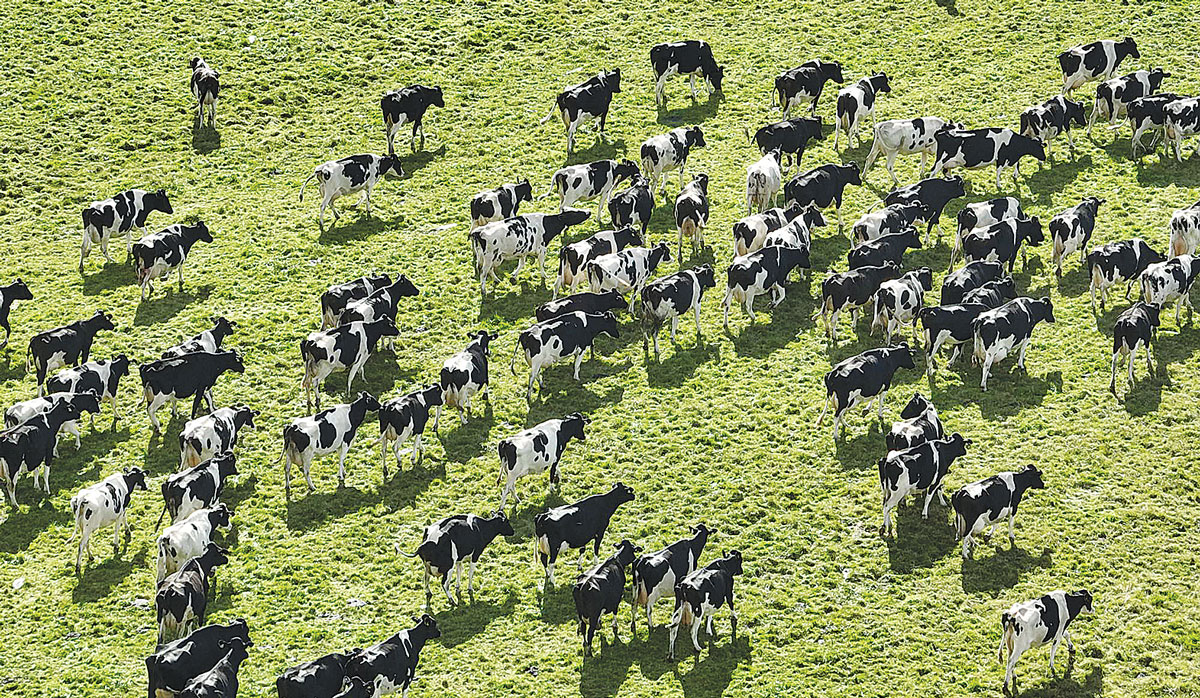Breeding Ewe Hoggets: Key tips for maximising lamb survival and farm profitability
With lamb prices at record highs, many farmers are considering breeding their ewe hoggets for the first time.
 Waiuku dairy farmers Nick and Nikki Ruygrok, Holstein Friesian breeders have spent their career perfecting the art of efficiency in their dairy herd.
Waiuku dairy farmers Nick and Nikki Ruygrok, Holstein Friesian breeders have spent their career perfecting the art of efficiency in their dairy herd.
Waiuku dairy farmers Nick and Nikki Ruygrok are passing on a dairy farming legacy to their sons that they can be proud of.
The Holstein Friesian breeders have spent their career perfecting the art of efficiency in their dairy herd - with ever-increasing production from 140 well-bred and well-fed cows.
The couple is in the early stages of succession planning with their sons Justin, Daniel and Mark. With Justin and Daniel dairy farming, Nick and Nikki are looking at how they can provide business opportunities to all three children in the future.
Nick has had a long career in farming. Born in Waiuku, he was brought up on dairy farms around the area by his Dutch immigrant, sharemilking parents.
"Farming has always been my passion, ever since I was young," he says. "Around the farm, I was always dad's main man."
After he achieved Bursary and completed high school, Nick took jobs around Waiuku, taking advantage of the contacts he had around the area.
At 21, Nick bought his first block of land and at 24, he secured a good sharemilking job in the area, where he ended up staying for 27 years.
When Nick was 27 he met Nikki, also a Dutch immigrant. They were married in 1989, and that was when Nick says their dairy farming career started to progress.
"I was pretty focused on saving, but it was when Nikki and I got together that things really started moving forward," Nick says.
"As a single sharemilker you can make progress, but with a partner it's far easier."
The couple bought their first little dairy farm at Putaruru two years after they met, on which they employed a sharemilker. They sold the Putaruru farm a few years later and bought a 130ha bare block at Waipango, western Southland, which they converted to dairy.
Four years later they sold the Waipango farm and bought 148ha at Lumsden, northern Southland. They slowly added on three neighbouring blocks until the property reached a total of 327ha.
"We've had the same sharemilker on that farm for the last 17 years," Nick says. "Over that time we've managed to hit our target of 380,000 kgMS."
Nick says it was in his early 50s that the hard graft of farming started to catch up with the couple, and they re-evaluated their farming career.
The couple gave up their sharemilking job, cashed in their surplus cows and bought a small 30ha farm in Waiuku.
"We sold the entire sharemilking herd, keeping the replacement heifers, empty cows and older cows," Nick says. "We started milking 100 cows on the Waiuku farm and over the next seven years, we managed to increase milksolids from 40,000 kgMS to 70,000 kgMS."
During this time, the couple's sons were following their own dreams. Mark, the eldest, became a pilot; Justin, the youngest, sharemilks on a property 3km from the family farm; and Daniel, a qualified builder, came home to far and is now sharemilking for Nick and Nikki.
"I bought the 20ha block across the road and, with an additional 50ha lease block, Daniel has increased milk production to 92,000 kgMS with 140 cows," Nick says.
Daniel does the day-to-day work on farm, including herd management and milking, while Nick takes care of the runoff, transferring dry and fresh cows as required.
Although Nick’s herd was crossbred throughout his sharemilking years, he says when it came time to reduce cow numbers it made logical sense to start breeding to Holstein Friesian.
“We haven’t had bobby calves for 15 years,” he says. “Every single Holstein Friesian calf that is born has value.
“They always make good money, and they have the best return. There is also options for dairy beef… there is no waste.”
Herd Classification
Nick says the herd is classified every year, and currently includes 60 Very Good (VG) and five Excellent (EX) cows.
“They are trending better each year, so it indicates to me that we are on the right track with our breeding,” he says. “But to me, really, they are just all good cows.”
“She is our highest-ever producing cow, with 963 kgMS in one lactation,” he says.
Now the Waiuku farm is performing well, Nick says his focus is to reduce debt by selling the Lumsden farm and create business opportunities for his sons.
Nick says he doesn’t like the word ‘retirement’, but a succession plan will give them the chance to ease into it.
“We want to focus on giving Daniel and Justin the opportunity to buy into small farms they can handle themselves,” he says. “To have an interest in the properties while the boys slowly buy into them, allowing them to grow and eventually take over, would be great.”
Nicks says he would encourage Daniel and Justin to stay reasonably small in their farming endeavours.
“I would discourage them from going big, particularly when their parents are in the position to help them along,” he says.
“Why push for numbers? It all comes down to cost per cow. They don’t need the hassle of staff that comes with a larger farm, or to burn themselves out. I would say, stay small and efficient.”
Winter Milking
With a winter milk contract, Daniel and Nick calve 45% of the herd in autumn (AB for three weeks, followed by the bull for three weeks), 45% of the herd in spring (AB for six weeks, followed by the bull for three weeks), and the remaining 10% in January.
Nick says calving three times a year is a lot of work, but it is to their advantage.
“Calves born in January are valuable as there is nothing around at that time of year,” he says.
“And when we dry off in autumn there is a group of freshly calved cows waiting. It keeps the milk flowing steadily throughout the year.”
The herd seldom carries empty cows as they have three chances to get in calf.
“We use a lot of sexed semen, which is less fertile than standard semen, but it works in our system,” Nick says. “Last year we reared 95 replacement heifer calves. We keep the best of the heifers, and sell the rest to the local market.”
Nick also works as an AB technician, inseminating around 4000 cows in the area annually. Having the resources to AB his own herd has allowed for greater flexibility and experimentation in their AB schedule, resulting in better outcomes.
Nick says with their high milk production (650 kgMS/cow, with a goal to hit 700 kgMS/cow), udder traits, capacity and strength are crucial when selecting sires; particularly important is breeding cows that are free milking and move through the shed quickly.
“I figure that if we have that right, everything else will fall into place,” he says. “I got caught up using only A2A2 bulls, and I’m not sure of the full benefits yet, but there was enough selection that we were able to do that.”
Nick says although he has never been “wound up” about BW, it has been interesting to observe overseas sires coming through with very high indexes, and what that might mean for the significance of BW.
“I prefer overseas bloodlines, with a reasonable index,” he says. “I’ve dabbled with a lot of sires over the years but more recently, Seagull-Bay Supersire-ET has done extremely well for us. He has left a lot of good cows, medium sized but capacious and strong.
 |
|---|
|
The 140 cows are mostly Holstein Friesians and produce 92,000 kgMS annually. |
“Bacon-Hill Montross-ET has also left some outstanding cows; they can really milk. Over the last eight-nine years, these bulls have done more for me than any others.”
Farm Facts
Changed logos on shirts otherwise it will be business as usual when Fonterra’s consumer and related businesses are expected to change hands next month.
Reflecting on the past year, Horticulture New Zealand chief executive Kate Scott says there has been a lot to celebrate.
Ministry for Primary Industries (MPI) Director General Ray Smith is giving a big shout-out to the horticulture sector, especially kiwifruit.
Early forecasts for New Zealand's apples and pears point to a standout season marked by exceptional fruit quality and high pack-out rates.
Tickets are now available for Beef + Lamb New Zealand’s (B+LNZ) Out the Gate, returning from 19-21 May 2026 at Te Pae, Christchurch.
Dairy Women's Network (DWN) is welcoming AgriHealth as a new partner.
OPINION: Fonterra may be on the verge of selling its consumer business in New Zealand, but the co-operative is not…
OPINION: What does the birth rate in China have to do with stock trading? Just ask a2 Milk Company.